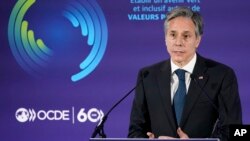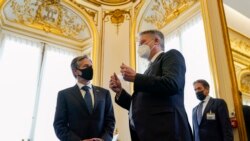French President Emmanuel Macron and U.S. Secretary of State Antony Blinken discussed potential areas of cooperation Tuesday, as Blinken visited Paris to try to improve relations between the two allies following a dispute about a security partnership among the United States, Britain and Australia.
A U.S. official told reporters the meeting, which was not on Blinken’s public schedule, lasted about 40 minutes, and included discussion of joint projects the two sides could announce during a meeting later this month between Macron and U.S. President Joe Biden.
Blinken held earlier talks Tuesday with French Foreign Minister Jean-Yves Le Drian and French National Security Adviser Emmanuel Bonne. The top U.S. diplomat also chaired the Ministerial Council Meeting of the Organization for Economic Cooperation and Development and made remarks on climate change, inequities faced by underserved populations, and global threats to democracy.
“The principles at the heart of this organization and our democracies are being challenged by authoritarian governments that argue their model is better at meeting people’s basic needs. Some of these same governments are actively seeking to undermine the rules-based order that has been fundamental to security and prosperity of our countries for generations,” Blinken said, without naming specific nations.
Blinken said member nations must “prove that our approach can make a better life for people … in all countries and in a way that’s more equitable than in the past” while holding “ourselves accountable.”
Tensions over AUKUS deal
U.S. President Joe Biden’s administration announced on September 15 a new security pact with Australia and Britain. Under the deal, Australia will get at least eight nuclear-powered submarines to be built domestically using American technology. The agreement came after Australia pulled out of an earlier deal with France for diesel-electric submarines, angering Paris.
France recalled its ambassadors to the United States and to Australia within two days following the announcement. Le Drian declared there is a “crisis of trust” in the United States.
After a phone call between President Biden and French President Emmanuel Macron on September 22 that sought to ease tensions over the submarine deal, both leaders decided to “open a process of in-depth consultations” to ensure “confidence.” Macron also decided that French Ambassador Philippe Etienne would return to Washington the following week.
Thursday, U.S. National Security Adviser Jake Sullivan met with Etienne at the White House to “continue advancing shared agenda,” in advance of Biden’s meeting with Macron in Europe at the end of October. Both are scheduled to attend the Group of 20 summit in Rome at that time.
“We need to make sure trust is there,” said Karen Donfried, the newly confirmed assistant secretary of state for European and Eurasian affairs, in a phone briefing on Friday.
While the U.S.-France relationship remains an important one for both sides, James Goldgeier, who is a senior visiting fellow at the Washington-based Brookings Institution, said the Biden administration “seems to have been a bit taken aback by the angry French reaction” to the AUKUS deal.
“It’s good that the two presidents are looking for ways to move forward. There is no question that the Biden administration sees the Indo-Pacific as its main focus. U.S. policy toward regions like Europe are seen through that lens,” Goldgeier told VOA.
The State Department said in a statement that the U.S. delegation to OECD’s October ministerial also includes Special Presidential Envoy for Climate John Kerry and U.S. Trade Representative Katherine Tai.
OECD & China
The OECD gathering will discuss the climate crisis, promoting the transition to net-zero emissions, as well as market-economy principles while continuing its commitment on shared values such as democracy, rule of law, and human rights.
A senior State Department official said another focus during the OECD meeting is the Blue Dot Network, a mechanism to certify infrastructure projects that meet robust international quality standards.
The United States, Japan and Australia launched the Blue Dot Network in 2019. Named for the view of Earth from space as a mere “blue dot,” it encourages development by certifying public-private investments in global infrastructure that are market-driven, transparent, and environmentally sustainable.
“The administration is very interested in engaging like-minded partners and allies to talk about the behaviors of non-market economies, including China,” said Matt Murray, a senior official from the State Department’s Bureau of Economic and Business Affairs, during a phone briefing on Friday.
Murray told VOA that China will participate in the OECD meeting as an observer.
“Separate from the ministerial council meeting, and more generally, the U.S. government has undertaken a comprehensive review of the U.S.-China trade relationship because the United States welcomes healthy, fair competition with our trading partners. And economic competition with the P.R.C. should be fair,” added Murray.
Blinken heads to Mexico
Blinken’s weeklong trip also includes a stop at Stanford University, as well as meetings in Mexico City from October 7-8 for the U.S.-Mexico High Level Security Dialogue.
He will join U.S. Homeland Security Secretary Alejandro Mayorkas and U.S. Attorney General Merrick Garland to discuss security issues, Mexican Foreign Minister Marcelo Ebrard said this week.
The high-level meeting comes amid a recent migration crisis as tens of thousands of Haitian migrants gathered at the U.S.-Mexico border last month.
The Biden administration confirmed on September 24 that a makeshift camp where 15,000 Haitian migrants braved desperate conditions along the U.S.-Mexico border was now vacant.
In late September, Mexico also began flying Haitian migrants back to their homeland.
Some information for this report came from the Associated Press and Reuters






